A wise person once told me, "Don't envy someone else unless you want their *entire* life."
That advice has stuck with me over the years and has cured me of most envy I would have for others.
I have a number of friends who are wealthier than me, and I certainly see strangers who look like they have some things I don't, but it often doesn't take long to see the holes in any desire for their life:
- They may be divorced or have an awful marriage, and I can see it in their slumped shoulders or fear when the phone rings
- Their kids may hate them or avoid them as the grow up in response to them never being around
- They could have a serious, yet functional drug or alcohol problem that has them constantly spiraling up and down
- Cancer, illness, or disease may plague them or a loved one they need to care for
The point isn't to be morbid here, but instead to remember that everyone is fighting different battles.
If you wish you didn't have your battles, chances are, even if the wish was granted, you'd simply be trading battles, not eliminating having them. And I think we're all best suited to fight the battles we were given, not anyone else's.
----
In today’s edition, we look at how you can make greatness emerge from everyone on your team, answer a great write-in question about getting your team to prepare for your 1 on 1s and bring topics, too, remind you to join our latest Lighthouse Lessons program starting next week, and share a story about Steve Jobs's greatest motivation (which surprised me!)
Let’s dive in…
Table of contents:
- 🥘 Food for Thought on How Leaders can Make Greatness Emerge in Everyone
- 🗣️ Ask Lighthouse on Getting Your Team Members to Prep for Your 1 on 1s with Them
- 🔜 Do you know the Secret Habits of Senior Leaders?
- ❓ Poll of the Week on Why You're a Manager + Steve Jobs's Deepest Motivation
➡️ Did a friend forward this to you? Get every issue straight to your inbox by signing up here.
Note: This is a preview of our weekly leadership newsletter, Lighthouse Leadership Weekly (LLW).
To get this sent to your inbox every week, along with our latest long form essays on this blog, you can sign up here.

🥘 Food for Thought
"Leadership is about recognizing that there's greatness in everyone, and your job is to create an environment where that greatness can emerge." - Bill Campbell, former coach for the executives at places including Google, Amazon, and Apple.
I've been reading Empowered, by Marty Cagan, which is the 2nd book in his trilogy of books on how the best tech companies in the world build products.
It's been a fascinating read not just because he's a legend in the product world, but because so much of the book is about a topic we talk a lot about at Lighthouse: Coaching.
And there are few more legendary coaches than Bill Campbell, who I was pleasantly surprised to see quoted early in Cagan's book.
(For those of you that don't know, Bill's impact, and the caliber of companies he worked with, was so great that the book about him was called, Trillion Dollar Coach. Yet, while Bill is a legend, I don't recommend the book because it couldn't decide what it wanted to be between sharing his tactics and Eric Schmidt telling nice, but unhelpful stories).
Today, I want to dive into what it really means to be a leader that lives up to creating an environment that brings out *everyone's* greatness.
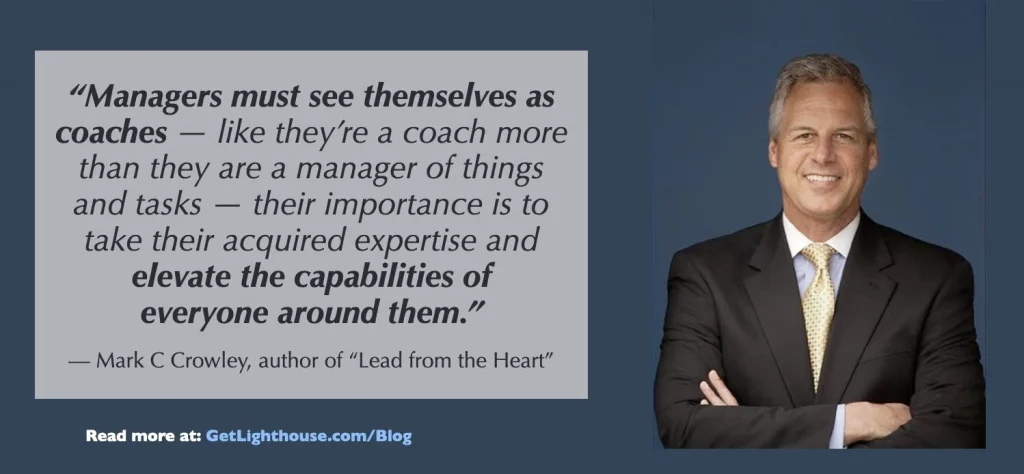
How to bring out *everyone's* greatness
Just about any leader can make sure 1 or 2 people on their team performs at their best.
As the saying goes, "Even a broken clock is right twice a day."
Whether it's your personalities matching perfectly, their mindset leading to growth despite your efforts, or simply the perfect role for them at the perfect time, there are many reasons for team member success that have little to do with you, their manager.
But you're reading this newsletter, it's because you want to be the best, so let's talk about what it really takes to go from "1 or 2" people on your team are great, to everyone (or at least most) being great.
1) Master Task Relevant Maturity
One of the most powerful concepts we teach often in our Lighthouse Lessons courses is that of Task Relevant Maturity. (That includes a lesson on applying it in our Secret Habits of Senior Leaders program starting next week)
Put simply, it's the idea that you should judge your team members based on their skills for individual tasks, not as a blanket approach either per person, or even worse, the same for everyone across your team. This then dictates when and how much you coach them:
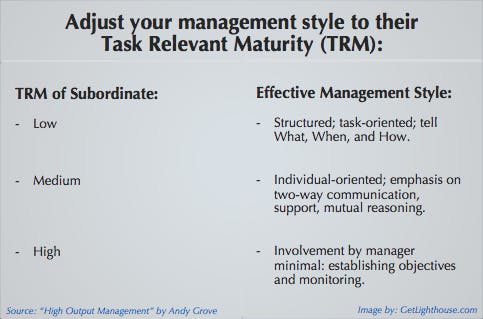
If you want your people to be great, you have to know when to be hands on and support them, and when to get out of the way. Too much of either at the wrong time will hurt you and frustrate them:
- Be too hands off when they really need help and they'll lose confidence and a key project can fail.
- Be too hands on when they already know how to do a task well and you'll frustrate them and often cause them to check out.
I find the table above (from Andy Grove's legendary High Output Management) to be one of the best, yet simple ways to keep this in mind. Simply applying it to how you support your team and divide your time and attention can make a big difference in how well everyone performs.
2) Focus on their strengths (and hire for it)
One of the counterintuitive, but real facts of leadership is that strengths are really where you get the best results.
When people are able to do what they are best at, they're happier and you often see outsized impacts.
As Gallup revealed in their great book, First Break All the Rules, strengths are a power-up for you and them:
"People who focus on their strengths every day are 6 times more likely to be engaged in their jobs, more productive and more likely to say they have an excellent quality of life."
But even more important were the stories they shared in the book about greatness.
For example, a leader saw one of their team members was doing incredible work, getting multiple times more work done than some of her peers. The leader sat down with them and helped discover ways they could get even better.
Not only did they unlock even greater performance, but many of the things they did could be taught to their peers, which then made everyone on the team better.
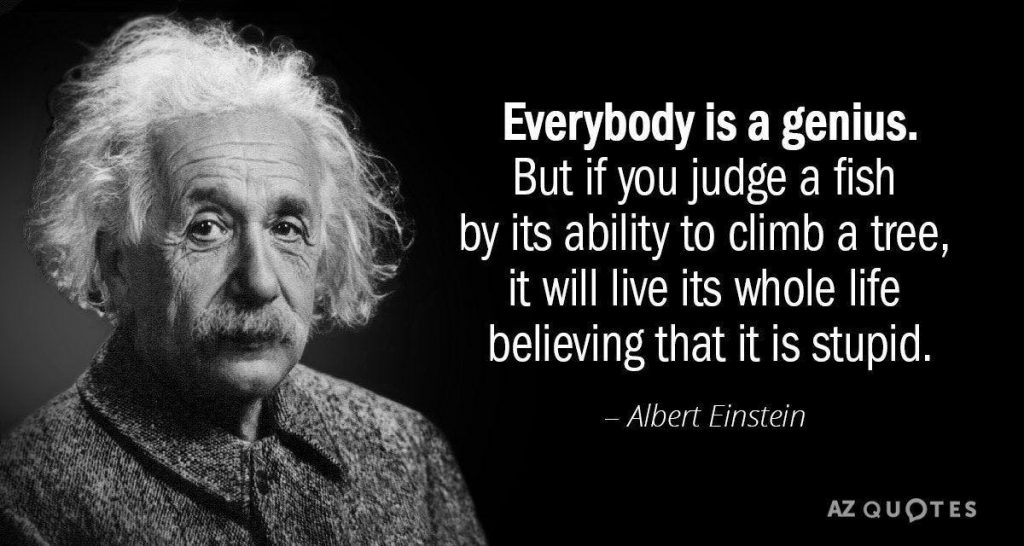
And equally important is this reminder above. Hiring your team with a focus on their strengths is the best path to helping them and your team to be great.
Everyone has weaknesses, but what you really need are people with the strength you need most in that role. As VC and former CEO Ben Horowitz reminds us:
"The more experience you have, the more you realize that there is something seriously wrong with every employee in your company (including you). Literally, nobody is perfect.
As a result, it is imperative that you hire for strength rather than lack of weakness...Hiring for lack of weakness just means that you'll optimize for pleasantness. Rather, you must figure out the strengths you require and find someone who is world class in those areas despite their weaknesses in other, less important domains."
Set you and your team up for greatness, but identifying what strength you really need, and focusing on hiring someone with that strength. Then, unleash them to use that strength every day.
3) Make time for coaching
As Horowitz just reminded us, no employee is perfect. Everyone has rough edges, weaknesses, and areas they can grow.
And the truth is, even if you hired someone into the perfect role to leverage their strengths, it's very likely at some point they will need to take on some other tasks.
That's where you, their manager come in.
No one will reach their full potential, or reach their highest potential greatness without you helping coach to get them there.
Remember: no one is born knowing much of anything. They have to learn and be taught.
And as a manager, it is your responsibility to make time to coach and improve your people. As Andy Grove wisely reminds us:
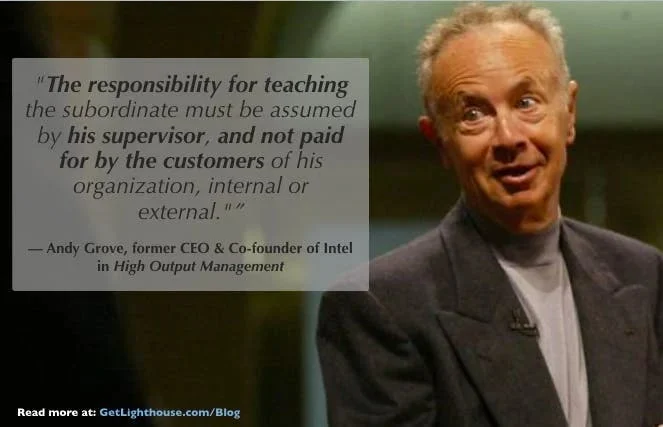
Your guidance and support can keep them on track, fill in gaps, and most importantly keep them motivated.
Your attention and support is also something most employees crave, especially when they're working on something where their Task Relevant Maturity is low (remember the chart in point 1?). They want to know you're there, you care, and get a hand when they're struggling.
And when it comes to greatness, it also means holding the quality bar high.
While much of your coaching will focus on new areas of growth and learning, or their weaknesses, you also sometimes have to coach them on their best work; that's when you let them know they're slipping, or their best wasn't good enough yet.
Often, that little nudge or call out can raise the bar for a team member who got a bit too comfortable.
So remember that your watchful eye matters, and being willing to teach, coach, and invest in your people is a key part of bringing out greatness.

4) Find ways for your people to stretch
We talk a lot about some of the unheralded and lesser known aspects of Steve Jobs's leadership, but I think one of his prominent skills applies here: Stretching people.
If you want to achieve greatness, you have to take chances and you have to push people beyond their comfort zone.
And in addition to Task Relevant Maturity, there are 3 great ways to help your team stretch:
1. Remember the Water Line
When the stakes are lower is the best time to give your team more chances to take risks and have more independence. Doing this with intention will build confidence for both of you, so they can then take on bigger challenges later.
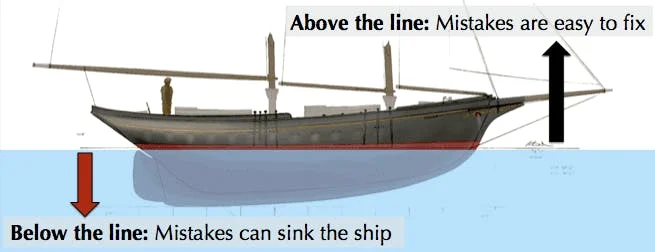
It also challenges you as a leader to truly understand the work of your team. Is that project really above the water line? Or what would you need to do to make it so? These are the kinds of questions great leaders bringing out greatness in their team ask themselves as they prepare projects.
2. Praise your team frequently
Sometimes I feel like a broken record with some of these tactics I write about in the Lighthouse Leadership Weekly. Yet, I hope while you grow tired of hearing about giving praise, you're also actually taking time out of your week to do it.
There's a reason Mary Kay Ash made this bold statement, and I could share a dozen other major, successful leaders saying the same thing:

And most importantly, when it comes to praise, is that it is directly tied to greatness. Teams that praise more outperformed everyone else:
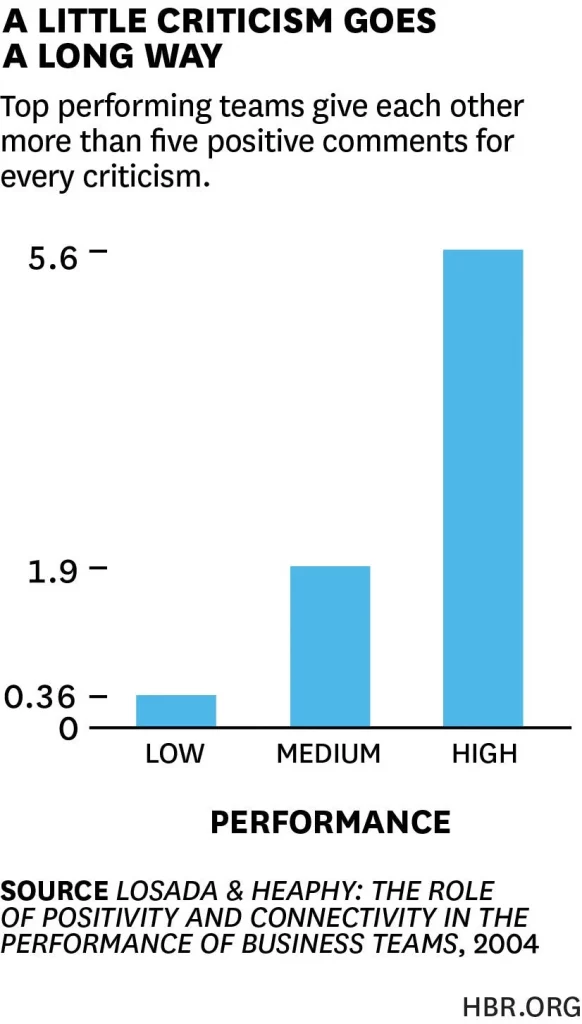
So if you're on a quest for greatness for you and your team, ask yourself if you're praising your team enough and setting an example of general positivity.
There is a BIG difference between 5 positive comments for 1 criticism, and 1 positive comment for every 3 criticism.
Which end of the spectrum are you on?
3) Check in often.
There's a reason Andy Grove and so many other leaders swear by 1 on 1s. You can get soooo much value from them.
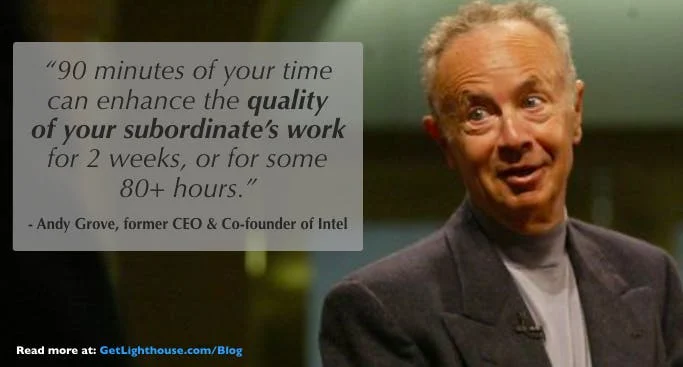
And one of the best ways to get value from your 1 on 1s is to spend them on things that will help you bring out greatness in everyone. That includes things that we've already discussed like:
- Giving detailed, specific praise for work they've done
- Coaching them to help improve their skills in a key area
- Discussing the Water Line for an upcoming project so you're both aligned
- Judging their Task Relevant Maturity and establish proper checks and involvement based on it
- Talking about their strengths and getting their ideas for how you can better leverage them
And just as important as those 5 tactics are for your 1 on 1s, it's also helpful to talk about them stretching and growing.
Whether it's taking on new, challenging projects, a promotion you want to get them ready for, a new role they could move into, or simply a different kind of task they could take on, having a real, candid, and private discussion about it in their 1 on 1s is the perfect way to have the conversation, and many of the follow ups that will come from it.
Always remember the fundamentals. Praise and high impact 1 on 1s can make a huge difference in making you and your team great.
5) Move, improve, or remove underperformers and jerks
I hate to end on a downer, but this one is important to remember. Sometimes addition by subtraction can make a big difference for you and your team.
Few things frustrate great employees as much as a weak performer holding the whole team up. There are many ways they can become a deadly tax on your team:
- Others can't count on your low performer, so they start trying to cover for them, slowing their own work.
- Bottlenecks from the low performer cause other team members to literally have to just sit and wait on them when they could be moving the ball forward.
- Frustration from low performers can damage morale and hurt the motivation of your great people.
- Mistakes by your low performer often have to be fixed by your top performers, costing you all time, budget, and attention.
Now, it's important to keep in mind the Einstein quote from earlier. Sometimes low performers are simply miscast; if you can find a better role for them, you often can set them up for success and relieve all the tension and problems.
You can also fix this by improving them. It's why we regularly share our battle-tested approach to improving underperformers.
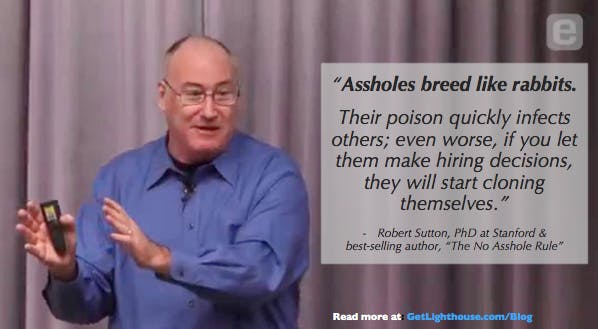
Yet, they're not the only troublemakers. It's also true that jerks can be just as big a problem for your team's morale and abilities to be great.
And getting rid of jerks can be just as big a relief for your team as removing or fixing a low performer. As a workplace study reported by Harvard showed:
"In comparing the two costs, even if a firm could replace an average worker with one who performs in the top 1%; it would still be better off by replacing a toxic worker with an average worker by more than two-to-one."
So while we encourage you to focus your quest for greatness on maximizing everyone's potential on your team, keep in mind, sometimes you will need to remove people from your team, even if they're individually doing some good (or even great) things.
---
Greatness is not achieved in a single day. It's part of a daily effort, and a true form of craftsmanship to create it.
What actions will you take this week to help your team members get closer to greatness?
🗣️ Ask Lighthouse on Getting Your Team Members to Prep for Your 1 on 1s with Them
A manager wrote in, having used our 1 on 1 meeting template for a few weeks, and wanted to know:
"How can I get more of my team to use the template and bring topics to discuss in our 1 on 1s?"
This is a great question and a common struggle for managers, so I'm glad we can address it in an Ask Lighthouse.
My answer:
Having a little structure can go a long way.
To be honest, your problem is a common one and why we give away the template, but don't have software for this anymore; the truth is getting any of your team to fill out information before your 1 on 1 is impressive. It's much more common for managers to have to really carry the load on 1 on 1s and planning them.
The main things I've seen to help your team with coming prepared to 1 on 1s are the following:
- Make sure you *always* comment on at least one thing they wrote so they know you read it. This is way more important than most managers realize, especially because you may not get to everything. They still need to know you saw it, so give it a 👍, leave a comment, or otherwise make it obvious.
- Send them some topics or questions ahead of time. It's often easier to think about what your manager wants if you're asking them, "How can we improve how our team works together?" or "Which meetings do you think are a waste?" than to simply ask them "bring anything you want to talk about!" The latter sounds friendly and flexible, but it puts a heavy weight on your team to know what's okay to talk about, or what you want to hear.
- Mix it up. The same thing every week can go stale and feel repetitive, so mixing up your ask can resonate with people in different ways. One question may fall flat with someone, but then your next one they'll have lots to say. This list of questions can help. Try a mix of them and you'll likely start to get more of your team to engage.
- Ask your team for feedback on the structure of your 1 on 1s themselves. Maybe some people don't feel like they have ideas that fit your structure, or have a hard time remembering to get in there (but write stuff down somewhere else). The key is, making even small tweaks makes them feel like they're a part of what you're creating, which makes buy in much easier.
- Give it time. Not everyone comes on board immediately when you make changes. However, when they see peers getting more out of your 1 on 1s, and see you consistently showing up anyways, it can slowly move them towards more active participation and buy in.
All of these tactics will help get more of your team to open up and actively participate in your 1 on 1s. They may even bring agenda items sometimes. Yet, always remember that while it's their meeting, your efforts to prepare, listen, and act are what make them consistently great.
A blank agenda from them doesn't mean they're checked out, or that your effort isn't appreciated. It just means they didn't fill in a box.
What matters much more is what happens in the actual meeting, and that largely comes from how you treat the meetings and your team. Get that right and I think you'll notice a few more agendas filled in, but most importantly a much stronger relationship with each person on your team.
🔜 Your Last Chance to Learn the Secret Habits of Senior Leaders
I'll keep this short:
You can join us for one of our all time most popular programs starting next week by signing up here.

And to quickly answer the most common questions we got last week:
- Take this anywhere: There are NO Zooms or scheduled calls to worry about time zones nor timing. You read and act on the bite-size email-based lessons at the day and time you choose each week. We even give you a bonus lesson to help ensure you schedule time to complete them.
- No holidays: These 12 lessons are perfectly timed to give you a break for Thanksgiving and then finish the week *before* Christmas and Hanukkah.
- Topics covered: We cover essential topics that will help you be ready to be promoted from a manager of ICs to manager of managers. It's also a great program if you're already in the manager of managers roles and need to fill in gaps, or train the managers under you. You can see everything you'll learn across our 12 lessons here.
And you can still get our early bird price if you reserve your spot this weekend. Prices go up Monday and continue to rise until the program retires again on Wednesday.
❓ Poll of the week
Last week we talked about coaching and what the hardest part is for managers:
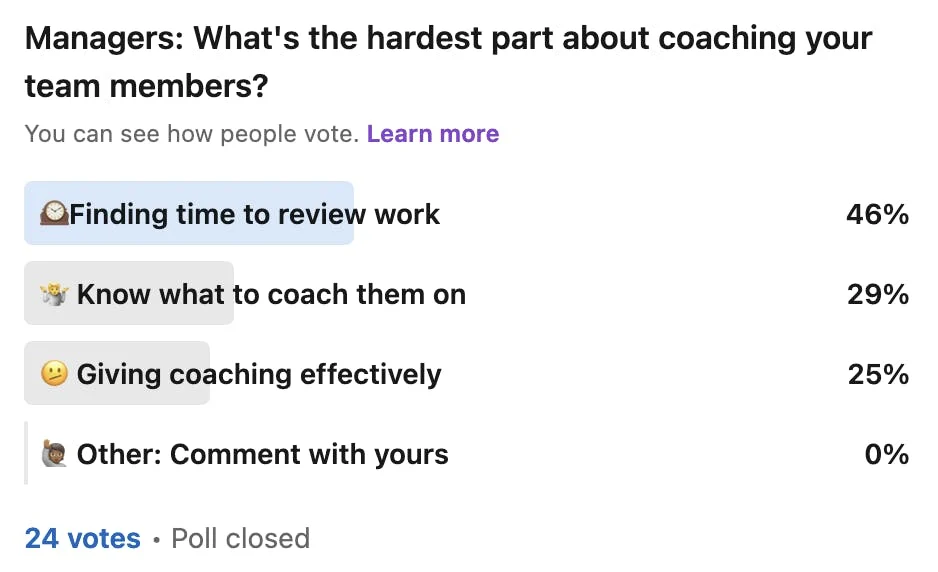
Roughly half of you struggled with finding enough time. With all the busy-ness of being a manager, that's understandable. It's why some leaders literally schedule some time each week to review work, or make it part of their planned prep time for 1 on 1s.
Either way, if you want to make coaching a habit, you have to prioritize it.
Now, this week we look at motivations for leaders.
What drives you? What is the biggest reason you're a leader?
Those are big, heavy questions, worth taking a moment to reflect.
And while there is no right or wrong answer, the mindset you have about it can significantly change how your career and the things you work on go.
So before you read the rest of this section, go take the poll here:
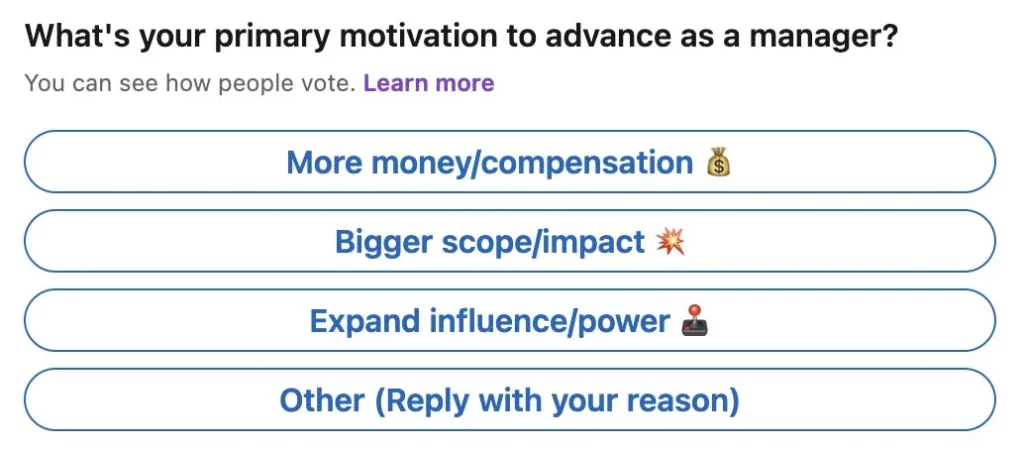
Okay. You took the poll, right? (If not click here and quickly enter your choice)
What motivates us can be surprising.
What you think motivates someone isn't always what you'd expect.
Look no further than Steve Jobs.
In his first run at Apple, he was brash, arrogant, and a little bit weird. He was difficult to work with and extremely passionate about quality.
And those characteristics led him to be run out of Apple. It forced him to take a hard look in the mirror and go on his major transformation to grow into the leader that would later save Apple.
And nowhere is that transformation more telling that Steve's answer to this question of what drove him as a leader:
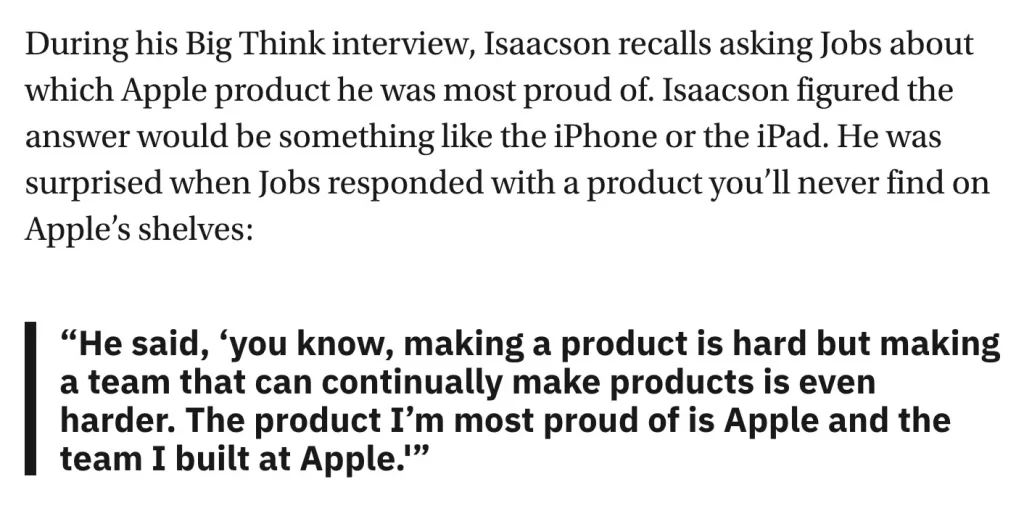
I'll be honest. That answer initially surprised me. Like Isaacson, I figured he'd pick one of his many transformative products. Yet, even someone as passionate and gifted at making products as Jobs embraced the challenge of leadership and people most.
And in my experience, that really is the most powerful motivation you can tap into as a leader.
Products come and go. Projects succeed and some fail.
Yet it's the people you work with, and the impact you have on them that really matters.
It's why I love sharing stories I learned from my father, and latch onto other great stories we see across the news, social media and the world.
In the end, we all spend half or more of our day to day life working.
Isn't it worth it to try to make it great? Isn't it worth it to make your people great?
One of the things I loved about working with Mark C Crowley and getting him involved in various Lighthouse projects is how much he embraces this mindset, too. That's why I'll end this question of what motivates you with a reminder from him:
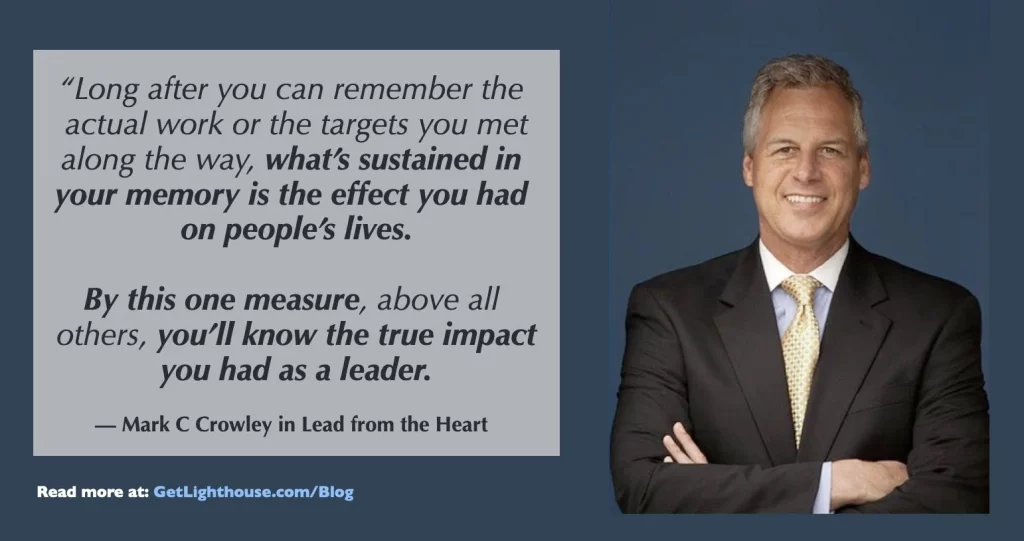
What drives you? How can you find more fuel, fire and motivation by serving and supporting your team?
Sign up to get this newsletter & our latest blog posts straight to your inbox:




